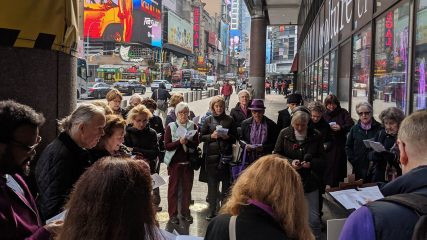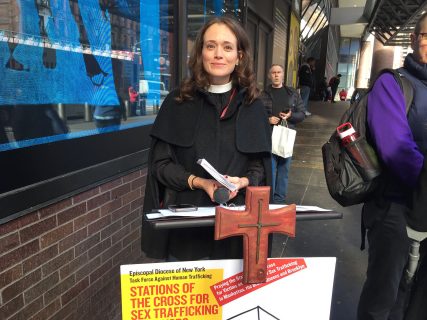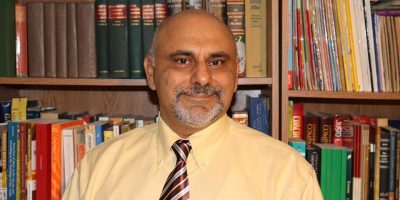Each stop on their route was a place where people are commonly ensnared and exploited by sex traffickers...
Stations of the Cross for trafficking victims protests New York’s decriminalization effort

A handful of 50 or so people led by the Rev. Adrian Dannhauser, who chairs the Episcopal Diocese of New York’s Taskforce Against Human Trafficking, stood amid the steady stream of commuters in the chill of an early April morning and read the New Testament account of Jesus being sentenced to death and taking up his cross.
Then it was on to other spots in Manhattan, the Bronx and Brooklyn by bus, stopping six more times to highlight the lives of sex trafficking’s victims through an abbreviated Stations of the Cross, a traditional penitential rite often performed during Lent on Good Friday, usually inside a church.
Each stop on their route was a place where people are commonly ensnared and exploited by sex traffickers and, with each stop, the group of pilgrims finding resonances between the suffering of victims of trafficking and the passion of Jesus: a strip club and “track” — a pick-up joint, in sex workers’ parlance — where Jesus falls for the first and third time; Covenant House, a Catholic Church refuge where victims are given succor and relief, an allusion to the fourth station, where Jesus meets his mother.
The last stop was a Brooklyn motel, notorious for its use as a brothel, to illustrate the moment when Jesus is nailed to the cross.
Though many Americans’ perception of sex trafficking is of foreigners who are tricked to coming to the U.S. against their will and all but imprisoned, most sex trafficking victims here are American born, according to Dannhauser. They often become sex slaves through a relationship with their abuser.
As Dannhauser accompanied the pilgrims on the stations, she shared a pre-recorded story and prayer from a former victim of sex trafficking she had counseled, named Iryna, who had met her pimp on the train: “I was madly in love with him, he was so attentive. But that didn’t last long. He became moody and controlling. He didn’t like my friends. Soon I couldn’t even sit right or stand right. So by the time he began selling me it wasn’t such a big deal — I already thought I was no good.”

The Stations of the Cross was also a mobile protest. In New York state, where, according to the advocacy group Sanctuary for Families, 4,000 children are sold and trafficked for sex purposes every night, legislators are considering a proposal to decriminalize all aspects of the sex trade. If approved, it would be the first such law in the U.S.
Dannhauser, associate rector at Church of the Incarnation in New York, and her colleagues are fiercely opposed to the bill. “If we allow this to happen we will go back to the days of the ’70s, when you had lines of African-American women lined up in Times Square like slaves on an auction block. Wherever you have men engaged in providing sex work, you have victims of trafficking. Decriminalize the industry and you increase demand and increase supply.”
Dannhauser wants to see the state adopt the so-called Nordic model, which decriminalizes those forced into the sex trade but criminalizes pimps and buyers of sexual services. She says her group’s ultimate aim is to put an end to the sex industry.
DecrimNY, a coalition to “decriminalize, decarcerate and destigmatize the sex trade” in New York that is backing the bill, claims that ending the demand for prostitution does not lead to a decrease in trafficking. “The outreach to trafficked workers is often through arrest and incarceration,” said DecrimNY spokeswoman Jessica Raven, “and that in itself is traumatizing. Those most likely to be exploited are the poor and homeless, and they should be reached through service provision and other resources.”
DecrimNY’s proposal also has the support of Amnesty International, Human Rights Watch and the World Health Organization. They point to a five-year study of the effects of decriminalization in New Zealand, which suggested that it had not led to an increase in the sex industry.
New York state Sen. Jessica Ramos, a Democrat who is sponsoring the proposal, is keen to draw a distinction between decriminalization and legalization. “We are not looking to legalize sex work or encourage the industry through licensing businesses,” she said. “But we need to acknowledge that this work takes place and that the best way to ensure that it is safe is to empower people to report violence against them when it happens.”
A key area of disagreement revolves around the extent to which people selling sex are free agents.
Anthony Favale, who until recently headed up the New York Police Department’s human trafficking unit, said that in his experience nearly everyone involved in prostitution had experienced coercion. “They may think they are doing this from choice, but if you go back far enough, you come back to the point where they were manipulated or forced,” he told Religion News Service. “Then they adapt to it. Some may not even see themselves as victims. Some become predators themselves.”
Ramos said she had no statistics to counter Dannhauser’s claim that 90 percent of sex workers have been trafficked, “but I can tell you anecdotally,” she said, “from the people I know in my district who are sex workers, that that is not true.”
She points instead to other ways people are victimized, i.e., by sex trade prosecution, citing police surveillance of men buying sex that is sometimes undertaken to identify and deport immigrants, rather than cut down on prostitution.
But Dannhauser says the ultimate goal must be to end prostitution altogether.
“Legislators should be looking at doing the hard work involved in providing sustainable alternatives to the sex trade,” she said. “Our job as Christians is to uphold and respect the dignity of every human being. Prostitution is inherently dehumanizing and falls far short of the abundant life to which God calls us.”
You can hear more about “New York Stations of the Cross” on the BBC World Service program Heart and Soul.
More XPian News stories… https://xpian.news




Comments are Closed